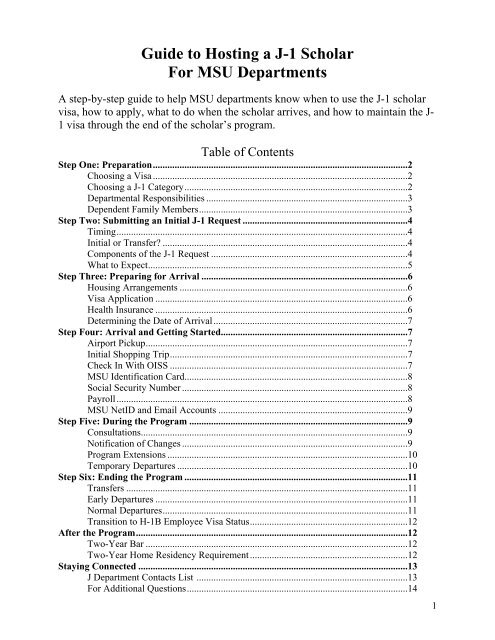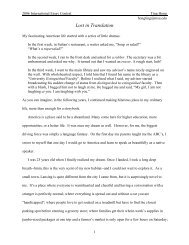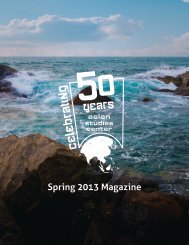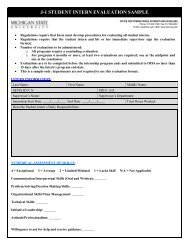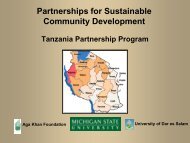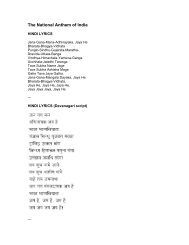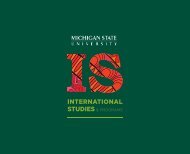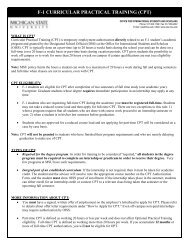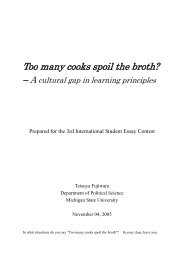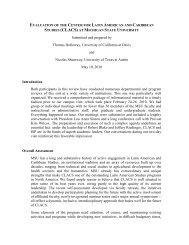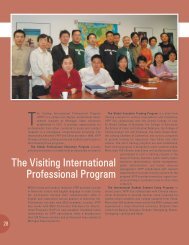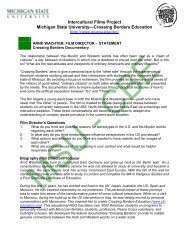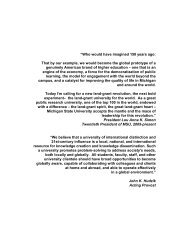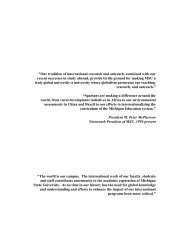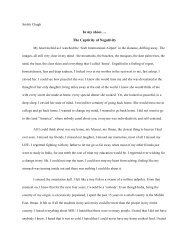Guide to Hosting a J-1 Scholar (PDF) - Office for International ...
Guide to Hosting a J-1 Scholar (PDF) - Office for International ...
Guide to Hosting a J-1 Scholar (PDF) - Office for International ...
You also want an ePaper? Increase the reach of your titles
YUMPU automatically turns print PDFs into web optimized ePapers that Google loves.
<strong>Guide</strong> <strong>to</strong> <strong>Hosting</strong> a J-1 <strong>Scholar</strong><br />
For MSU Departments<br />
A step-by-step guide <strong>to</strong> help MSU departments know when <strong>to</strong> use the J-1 scholar<br />
visa, how <strong>to</strong> apply, what <strong>to</strong> do when the scholar arrives, and how <strong>to</strong> maintain the J-<br />
1 visa through the end of the scholar’s program.<br />
Table of Contents<br />
Step One: Preparation.........................................................................................................2<br />
Choosing a Visa .........................................................................................................2<br />
Choosing a J-1 Category............................................................................................2<br />
Departmental Responsibilities ...................................................................................3<br />
Dependent Family Members......................................................................................3<br />
Step Two: Submitting an Initial J-1 Request ....................................................................4<br />
Timing ........................................................................................................................4<br />
Initial or Transfer .....................................................................................................4<br />
Components of the J-1 Request .................................................................................4<br />
What <strong>to</strong> Expect...........................................................................................................5<br />
Step Three: Preparing <strong>for</strong> Arrival .....................................................................................6<br />
Housing Arrangements ..............................................................................................6<br />
Visa Application ........................................................................................................6<br />
Health Insurance ........................................................................................................6<br />
Determining the Date of Arrival................................................................................7<br />
Step Four: Arrival and Getting Started.............................................................................7<br />
Airport Pickup............................................................................................................7<br />
Initial Shopping Trip..................................................................................................7<br />
Check In With OISS ..................................................................................................7<br />
MSU Identification Card............................................................................................8<br />
Social Security Number .............................................................................................8<br />
Payroll ........................................................................................................................8<br />
MSU NetID and Email Accounts ..............................................................................9<br />
Step Five: During the Program ..........................................................................................9<br />
Consultations..............................................................................................................9<br />
Notification of Changes .............................................................................................9<br />
Program Extensions ...................................................................................................10<br />
Temporary Departures ...............................................................................................10<br />
Step Six: Ending the Program ............................................................................................11<br />
Transfers ....................................................................................................................11<br />
Early Departures ........................................................................................................11<br />
Normal Departures.....................................................................................................11<br />
Transition <strong>to</strong> H-1B Employee Visa Status.................................................................12<br />
After the Program................................................................................................................12<br />
Two-Year Bar ............................................................................................................12<br />
Two-Year Home Residency Requirement.................................................................12<br />
Staying Connected ...............................................................................................................13<br />
J Department Contacts List .......................................................................................13<br />
For Additional Questions...........................................................................................14<br />
1
Step One: Preparation<br />
Choosing a Visa<br />
Once you know you will host an academic guest from abroad, it is important <strong>to</strong> choose the<br />
correct visa <strong>for</strong> the situation. The fact that you are reading this guide indicates that you will most<br />
likely use the J-1 visa, however some programs might be better served by using a different visa.<br />
In very general terms:<br />
• The B-1/B-2 visi<strong>to</strong>r visa is best <strong>for</strong> very short visits (1-2 months or less)<br />
• The H-1B employment visa is the best <strong>for</strong> incoming employees who will be paid salaries<br />
commensurate with US faculty pay scales<br />
If you think that a visi<strong>to</strong>r visa or an employment visa might be a better fit <strong>for</strong> your situation,<br />
please visit the “<strong>Scholar</strong> Visa Decision Tree” on our website at:<br />
http://www.oiss.msu.edu/scholartree.php<br />
If you view the decision tree and still aren’t sure, please contact OISS <strong>for</strong> clarification.<br />
Choosing a J-1 Category<br />
Once you are sure that the J-1 visa is right <strong>for</strong> your situation, it is now time <strong>to</strong> choose the<br />
appropriate J-1 category <strong>to</strong> use. MSU has authorization <strong>to</strong> use the following three categories <strong>for</strong><br />
hosting international scholars:<br />
• Research <strong>Scholar</strong><br />
• Professor<br />
• Short-Term <strong>Scholar</strong><br />
For complete definitions of the above categories, please see Appendix A.<br />
General rules <strong>for</strong> choosing a category:<br />
• If you are certain that the scholar will be at MSU <strong>for</strong> six months or less, the Short-Term<br />
<strong>Scholar</strong> category is best.<br />
• If the scholar will be here longer than six months, or if there is a strong possibility of an<br />
extension that would push the program beyond six months, the Research <strong>Scholar</strong> or Professor<br />
categories are best.<br />
o If the scholar will primarily conduct research, collaborate, and/or observe in<br />
connection with a research project, the Research <strong>Scholar</strong> category is best.<br />
o If the scholar will primarily teach courses, the Professor category is best.<br />
When choosing a category, you should also be aware of the potential <strong>for</strong> certain restrictions. The<br />
scholar may already be subject <strong>to</strong> one of these restrictions, which may hinder his/her ability <strong>to</strong><br />
use the J-1 visa. By using the J-1 visa, the scholar may also incur restrictions on future visa use.<br />
For a table describing J-1 visa restrictions please see Appendix B. If you have questions about<br />
these restrictions or need help interpreting how the restrictions will affect your choice of a J-1<br />
category, please contact OISS.<br />
2
Departmental Responsibilities<br />
Be<strong>for</strong>e you move <strong>for</strong>ward with the J-1 visa process, please make sure that your department is<br />
prepared <strong>to</strong> take on the responsibility of hosting a J-1 scholar. For a complete list of J-1 Host<br />
Department Responsibilities, please see Appendix C.<br />
The host department must also ensure that sufficient funding is available <strong>for</strong> the program. Some<br />
scholars are funded by the host department and others are funded by outside sources, which may<br />
include US or <strong>for</strong>eign governments, a college/university in the scholar’s home country, a nongovernment<br />
agency, or the scholar’s personal/family finances.<br />
Funding Minimums:<br />
• J-1 <strong>Scholar</strong>: US$1,500 per month / US$18,000 per year<br />
• J-2 Spouse of J-1 <strong>Scholar</strong>: US$5,000 per year (may be pro-rated <strong>for</strong> shorter programs)<br />
• J-2 Child of J-1 <strong>Scholar</strong>: US$3,000 per year (may be pro-rated <strong>for</strong> shorter programs)<br />
While the J-1 visa does not require that the host department pay any fees, there is a $180 fee<br />
(called the SEVIS fee) that must be paid prior <strong>to</strong> the scholar’s visa application. This fee may be<br />
paid by the host department or by the scholar – the host department decides.<br />
Dependent Family Members<br />
The spouse and dependent children (unmarried and under age 21) of a J-1 scholar are eligible <strong>to</strong><br />
apply <strong>for</strong> J-2 dependent visas. J-2 documentation may either be requested at the same time that<br />
the J-1 scholar’s documentation is requested or it may be requested after the scholar has arrived.<br />
In the latter case, the scholar will request these documents directly from the OISS; no<br />
departmental involvement is required.<br />
A J-2 spouse may apply <strong>for</strong> work authorization after arrival. The OISS has an application packet<br />
available in 105 <strong>International</strong> Center or on the website. No job is needed in order <strong>to</strong> apply <strong>for</strong><br />
work authorization. Once work authorization is granted, the J-2 spouse is free <strong>to</strong> work anywhere<br />
in the US, part- or full-time. A J-2 spouse may also attend classes at any level of study, though<br />
we recommend a spouse who enters a degree-seeking program strongly consider gaining an<br />
independent student visa status.<br />
J-2 children may attend public or private primary and secondary schools and may also study at a<br />
college or university. J-2 children who are approaching age 21 must either change their visa<br />
status or depart the US be<strong>for</strong>e their 21 st birthday.<br />
All J-2 dependents must maintain health insurance coverage at all times while in the US. Health<br />
insurance requirements are discussed in more detail under “Step Three: Preparing <strong>for</strong> Arrival.”<br />
3
Step Two: Submitting an Initial J-1 Request<br />
Timing<br />
It is crucial that you allow eight weeks in between the day you submit the completed J-1 request<br />
and the day you would like the J-1 scholar <strong>to</strong> walk through your door. This allows sufficient<br />
time <strong>for</strong> internal processing, shipping the documents <strong>to</strong> the scholar, application <strong>for</strong> a US visa,<br />
and travel <strong>to</strong> East Lansing. Applications submitted with a shorter time frame are subject <strong>to</strong> date<br />
changes at the discretion of OISS.<br />
Initial or Transfer<br />
If the scholar is currently in his/her home country, then you will submit a J-1 request indicating<br />
“Initial Request.” If the scholar is already in the US in J-1 scholar status, you will submit a J-1<br />
request indicating “Transfer <strong>to</strong> MSU from a US Institution.” The components of the Initial and<br />
Transfer requests are essentially the same. The Transfer request requires a little bit of additional<br />
in<strong>for</strong>mation about the institution that will transfer the scholar <strong>to</strong> MSU. If the scholar is already<br />
in the US but in a visa status other than J-1 scholar, indicate “Initial Request” and attach<br />
documentation of the prospective scholar’s current visa status. The OISS can help the scholar<br />
change his/her status <strong>to</strong> J-1 scholar.<br />
Components of the J-1 Request<br />
The host department submits a J-1 Request <strong>to</strong> OISS. The OISS will create a DS-2019 <strong>for</strong>m,<br />
which is the Certificate of Eligibility <strong>for</strong> Exchange Visi<strong>to</strong>r (J-1) Status. The DS-2019 is used <strong>to</strong><br />
obtain a J-1 visa stamp from a US Consulate abroad (unless the scholar is already in the US) and<br />
<strong>for</strong> verification purposes throughout the J-1 scholar’s program.<br />
A complete Initial Request <strong>for</strong> a J-1 scholar consists of the following documents:<br />
1. Completed J-1 DS-2019 request <strong>for</strong>m<br />
2. Invitation letter on departmental letterhead, which must include the following<br />
in<strong>for</strong>mation:<br />
a. Specific beginning and ending dates of the scholar’s program<br />
b. Summary of the scholar’s proposed activities<br />
c. Specific amount of payment, if any<br />
3. Pho<strong>to</strong>copy of the scholar’s passport (identification page only)<br />
4. Pho<strong>to</strong>copies of dependents’ passports (if applicable)<br />
5. <strong>Scholar</strong>’s CV<br />
6. Proof of funding (if not being fully funded by the host department). Documents must be<br />
in English or be at least clearly unders<strong>to</strong>od by someone who does not speak the language<br />
in question. Sponsorship letters must list a specific funding amount. Acceptable<br />
documents <strong>for</strong> proof of funding include:<br />
a. Sponsorship letter from US Government agency<br />
b. Sponsorship letter from <strong>for</strong>eign government<br />
c. Sponsorship letter from non-government agency<br />
4
d. Personal or family bank statement showing a positive balance meeting the<br />
minimum funding requirements.<br />
7. If the scholar has been in J-1 status during the previous 5-year period, please include<br />
pho<strong>to</strong>copies of all previous DS-2019s.<br />
NOTE: When choosing the beginning and ending dates of the program, do not fac<strong>to</strong>r in extra<br />
time <strong>for</strong> travel. J-1 scholars may enter the US up <strong>to</strong> 30 days prior <strong>to</strong> the program start date and<br />
may depart the US up <strong>to</strong> 30 days after the program end date.<br />
Three examples of a complete Initial Request <strong>for</strong> a J-1 scholar may be found in Appendix D.<br />
What <strong>to</strong> Expect<br />
The OISS asks <strong>for</strong> 7-10 business days <strong>to</strong> complete a new DS-2019. Once the documents are<br />
ready, we will notify the departmental contact listed on the application <strong>for</strong>m. Due <strong>to</strong> the<br />
sensitive nature of visa documents, we do not use campus mail <strong>to</strong> send original documents <strong>to</strong><br />
departments. Please arrange <strong>for</strong> someone from the host department <strong>to</strong> pick up the documents in<br />
room 103 of the <strong>International</strong> Center. OISS office hours are Monday through Friday, 8am <strong>to</strong><br />
12pm and 1pm <strong>to</strong> 5pm.<br />
The envelope you will receive will contain two packets, one <strong>for</strong> your department <strong>to</strong> keep and one<br />
<strong>for</strong> you <strong>to</strong> send <strong>to</strong> the scholar.<br />
The department packet will include:<br />
• Summary of departmental responsibilities<br />
• Pho<strong>to</strong>copy of the scholar’s DS-2019 (and pho<strong>to</strong>copies of dependents’ DS-2019s, if<br />
applicable)<br />
• ZPID notification page (the SSN listed on this page is not a real SSN – it is only a<br />
placeholder)<br />
• SEVIS Fee instructions<br />
The scholar’s packet will include:<br />
• Welcome letter<br />
• Brochure from the US Department of State outlining the J-1 Exchange Visi<strong>to</strong>r program<br />
• Original DS-2019 (and DS-2019s <strong>for</strong> dependents, if applicable)<br />
• ZPID notification page<br />
• Flier about scholar health insurance<br />
• Summary of scholar responsibilities<br />
• SEVIS Fee instructions<br />
NOTE: If your department has elected <strong>to</strong> pay the SEVIS fee, you must do so and include the<br />
receipt with the packet that is sent <strong>to</strong> the scholar. The fee may be paid online with a credit card<br />
at www.fmjfee.com and the receipt may be printed immediately. For more detailed in<strong>for</strong>mation<br />
on the SEVIS fee, please see Appendix E.<br />
5
Housing Arrangements<br />
Step Three: Preparing <strong>for</strong> Arrival<br />
It is the host department’s responsibility <strong>to</strong> make housing arrangements <strong>for</strong> the J-1 scholar and<br />
any accompanying family members. Please finalize these arrangements prior <strong>to</strong> the scholar’s<br />
arrival. If the scholar would prefer <strong>to</strong> live on the MSU campus, please contact University<br />
Housing:<br />
University Housing Assignments <strong>Office</strong><br />
Phone: 355-9550<br />
Email: housing-info@uh.msu.edu<br />
Location: 100 University Housing Building<br />
Visa Application<br />
If the scholar is outside the US, he/she should contact the nearest US Consulate <strong>to</strong> schedule an<br />
appointment <strong>to</strong> apply <strong>for</strong> a J-1 visa. If the scholar is paying the SEVIS fee, they must do so prior<br />
<strong>to</strong> the visa application. The visa application process could be anywhere from a matter of a few<br />
days in some cases <strong>to</strong> weeks or months in other cases. The length of time it takes <strong>to</strong> get a visa<br />
depends on many fac<strong>to</strong>rs, including the location of the Consulate, the scholar’s citizenship,<br />
and/or the scholar’s area of study. For more detailed in<strong>for</strong>mation on potential visa problems,<br />
please see Appendix F.<br />
Transfers and Changes of Status: If the scholar is already in the US in J-1 scholar visa status,<br />
they will make the transfer arrangements with their current institution and with OISS and then<br />
simply show up on or after their transfer date. OISS will issue the DS-2019 at the time they<br />
arrive at MSU. (The DS-2019 is not needed in advance of a transfer arrival.) If the scholar is<br />
already in the US in a different visa status, arrangements may vary depending on their current<br />
visa status.<br />
Health Insurance<br />
All J-1 and J-2 visa holders are required by federal regulation <strong>to</strong> carry sufficient health insurance<br />
at all times during their stay in the US. If the scholar will receive health insurance as a benefit of<br />
MSU employment, then this requirement will be fulfilled. If the scholar is not receiving health<br />
insurance from MSU, he/she is responsible <strong>for</strong> obtaining sufficient health insurance coverage.<br />
Minimum health insurance requirements are listed under Appendix G.<br />
Alternative health insurance coverage can come from one of the following three sources:<br />
1. MSU Benefits <strong>Office</strong> – scholars may purchase an optional plan from Aetna Student<br />
Health. This is the same group plan used by MSU international students.<br />
2. Home country – scholars may bring a health insurance policy from home. The policy<br />
must meet the minimum requirements.<br />
3. Private company in US – scholars may purchase health insurance from a private company<br />
in the US.<br />
6
<strong>Scholar</strong>s will be asked <strong>to</strong> verify their health insurance coverage shortly after arrival.<br />
For more in<strong>for</strong>mation on health insurance requirements, family coverage, how <strong>to</strong> shop <strong>for</strong> a<br />
private insurance policy, and where <strong>to</strong> go <strong>for</strong> health care, please visit<br />
www.oiss.msu.edu/health.php.<br />
Determining the Date of Arrival<br />
Though you may have picked an approximate arrival date when you determined the J-1 program<br />
start date, we recognize that certain events may serve <strong>to</strong> either accelerate or delay the arrival of<br />
the scholar. J-1 <strong>Scholar</strong>s may enter the US up <strong>to</strong> 30 days prior <strong>to</strong> or up <strong>to</strong> 20 days after the<br />
program start date. If you <strong>for</strong>esee that the actual arrival date will fall outside of this window, it<br />
is very important <strong>to</strong> contact OISS immediately.<br />
Airport Pickup<br />
Step Four: Arrival and Getting Started<br />
It is the host department’s responsibility <strong>to</strong> ensure that the scholar has safe transportation from<br />
the airport <strong>to</strong> their lodgings. If the scholar is flying in<strong>to</strong> the Lansing Capital City Airport, please<br />
arrange <strong>for</strong> a departmental representative <strong>to</strong> pick them up. If the scholar is flying in<strong>to</strong> the Detroit<br />
Metro Airport, please either send a representative <strong>to</strong> pick them up or help them book a ticket on<br />
the Michigan Flyer bus service (www.michiganflyer.com), which runs from the Detroit Metro<br />
Airport <strong>to</strong> the City Center Marriott in East Lansing. If the bus service is used, please arrange <strong>to</strong><br />
pick up the scholar at the Marriott.<br />
Initial Shopping Trip<br />
It is also the host department’s responsibility <strong>to</strong> assist the scholar in obtaining items that are<br />
immediately necessary (i.e. bedding, <strong>to</strong>wels basic cooking supplies if needed). This usually<br />
involves a single trip <strong>to</strong> a discount retailer (i.e. Meijer, Wal-Mart) and/or a grocery s<strong>to</strong>re, but<br />
may include more if the scholar has unique needs. Thereafter the scholar should be able <strong>to</strong> either<br />
navigate the CATA bus system (www.cata.org) or purchase/lease a car <strong>for</strong> use while they are<br />
here.<br />
Check In With OISS<br />
The scholar should complete the manda<strong>to</strong>ry check-in process at the OISS as soon as possible<br />
after arrival. This process is necessary <strong>to</strong> properly activate their J-1 visa status. Failure <strong>to</strong> check<br />
in with OISS in a timely manner can result in loss of J-1 visa status! The scholar should bring the<br />
following documents <strong>to</strong> the check-in:<br />
• Passport<br />
• I-94 card (small white card received at the Immigration post in the airport)<br />
• DS-2019<br />
7
• Emergency contact in<strong>for</strong>mation – one contact in home country and one in US<br />
At the check-in, the scholar will receive a welcome packet and an appointment <strong>to</strong> attend the next<br />
<strong>Scholar</strong> Orientation. If the scholar will also be an employee, we will complete the I-9 <strong>for</strong>m and<br />
sign the Social Security endorsement letter.<br />
MSU Identification Card<br />
A newly arrived scholar is immediately eligible <strong>for</strong> an MSU Identification Card. To request a<br />
card, the scholar should go <strong>to</strong> the Campus Card Services office in room 50 in the Administration<br />
Building and present his/her passport, DS-2019, and the Z-PID notification page. Spouses of<br />
visiting scholars may also obtain an MSU ID Card.<br />
Social Security Number<br />
<strong>Scholar</strong>s who will be paid by MSU must apply <strong>for</strong> a Social Security Number (SSN). <strong>Scholar</strong>s<br />
who will not be paid by MSU are not required <strong>to</strong> apply <strong>for</strong> an SSN, however they are eligible <strong>to</strong><br />
apply <strong>for</strong> one if they wish. Social Security is now a requirement <strong>for</strong> a Michigan driver’s license,<br />
there<strong>for</strong>e if the scholar intends <strong>to</strong> drive, they should apply <strong>for</strong> the SSN.<br />
IMPORTANT: Newly arrived scholars must wait 10 days after their date of entry <strong>to</strong> the<br />
US be<strong>for</strong>e applying <strong>for</strong> a Social Security Number. Applications submitted <strong>to</strong>o early often<br />
result in added delays of one month or more.<br />
Applications <strong>for</strong> an SSN are submitted at the local Social Security Administration office, which<br />
is located at 5210 Perry Robinson Cir, Lansing, MI 48911. The following documents are<br />
required <strong>for</strong> an application:<br />
• Passport<br />
• I-94 card<br />
• DS-2019<br />
• Social Security endorsement letter (from OISS)<br />
If possible, please help the scholar find transportation by car <strong>to</strong> the Social Security<br />
Administration office. It is possible <strong>to</strong> go there by bus; however it is quite time consuming (45-<br />
60 minutes each way with a bus transfer down<strong>to</strong>wn).<br />
J-2 dependents are not eligible <strong>for</strong> an SSN unless he/she has been granted J-2 work authorization.<br />
Payroll<br />
If the scholar will be paid by MSU, he/she should visit the MSU Payroll <strong>Office</strong> (Room 350<br />
Admin. Bldg.) after receiving the Social Security card. In addition <strong>to</strong> the Social Security Card,<br />
the scholar should also bring his/her passport, DS-2019, and MSU ID card. The Payroll <strong>Office</strong><br />
will calculate the proper amount of tax <strong>to</strong> be deducted from the scholar’s income according <strong>to</strong> the<br />
tax treaty between the US and the scholar’s country of citizenship.<br />
8
MSU NetID and Email Accounts<br />
To request a new MSU NetID and email account, the scholar should take the following steps:<br />
• Go online <strong>to</strong> http://help.msu.edu/netid.<br />
• Click on "2. Request my PIN (Lost PIN or New PIN)".<br />
• Click on "Postdoc/Visiting <strong>Scholar</strong>s".<br />
• Under "Employment Status" choose the option that describes the scholar’s situation: If he/she<br />
is being paid by MSU, click the dot next <strong>to</strong> "Postdoc/Visiting <strong>Scholar</strong> with Appointment". If<br />
the scholar is not being paid by MSU, click the dot next <strong>to</strong> "Postdoc/Visiting <strong>Scholar</strong> without<br />
Appointment".<br />
• The scholar should choose his/her preferred NetID. It must be between two and eight<br />
characters long and use letters or numbers.<br />
• Under "MSU ID Number", use the 9-digit ID number on the MSU ID Card (the ZPID).<br />
• Follow the remaining instructions on the website and the MSU email account will be<br />
activated within 24 hours. The scholar can choose <strong>to</strong> pick up his/her in<strong>for</strong>mation in Room<br />
220 of the Computer Center or receive the in<strong>for</strong>mation by mail.<br />
NOTE: If the scholar is being paid by MSU, he/she must also fax the appointment papers <strong>to</strong><br />
(517) 353-2006.<br />
Consultations<br />
Step Five: During the Program<br />
If the scholar wishes <strong>to</strong> consult with an advisor at OISS regarding his/her visa status or any other<br />
related concerns, our office is open <strong>for</strong> walk-in advising (no appointment needed) every weekday<br />
between 1pm and 3pm. If the scholar cannot come <strong>to</strong> walk-in advising, he/she can call (517)<br />
353-1720 <strong>to</strong> schedule an appointment <strong>for</strong> another time. Our lobby is located in room 105 of the<br />
<strong>International</strong> Center.<br />
Notification of Changes<br />
If a significant aspect of the scholar’s program changes at any time, please notify the OISS<br />
immediately. Examples of events that would need a notification include:<br />
• Change in funding (i.e. scholar gains or loses funding from the host department or other<br />
source)<br />
• Change in biographical data (i.e. legal name change, change in permanent residence status)<br />
• Change in site of activity (i.e. transfer from one MSU department <strong>to</strong> another, transfer from<br />
one research site <strong>to</strong> another)<br />
• Acceptance of a tenure-track faculty position<br />
9
Program Extensions<br />
Extending a scholar’s program end date is both common and easy <strong>to</strong> do. Extensions cost nothing<br />
<strong>to</strong> either the host department or the scholar and are processed internally at the OISS – no outside<br />
application <strong>to</strong> any government agency is needed.<br />
The extension application is submitted by the host department, not the scholar. A complete<br />
extension application will contain the following documents:<br />
• Completed J-1 <strong>Scholar</strong> DS-2019 Extension Request<br />
• Extension memo from the host department. The memo should be printed on departmental<br />
letterhead and contain the following in<strong>for</strong>mation:<br />
o New end date of the scholar’s program<br />
o How much funding the scholar will receive from the department, if applicable<br />
• Supplemental funding documentation, if needed<br />
An example of a complete request <strong>for</strong> a J-1 scholar program extension can be found under<br />
Appendix H.<br />
The OISS asks <strong>for</strong> 7-10 business days <strong>to</strong> complete a J-1 scholar extension request. Once the new<br />
DS-2019 is ready, we will notify the departmental contact listed on the application <strong>for</strong>m. Please<br />
arrange <strong>for</strong> someone from the host department <strong>to</strong> pick up the documents in room 105 of the<br />
<strong>International</strong> Center. If you wish, you can send the scholar <strong>to</strong> pick it up. If the scholar is also an<br />
employee, he/she can bring his/her passport and I-94 card <strong>to</strong> our office and then fill out the new<br />
I-9 <strong>for</strong>m as well.<br />
Note on Visa Stamps:<br />
When an extension request is completed, the DS-2019 is extended, but the J-1 visa stamp in the<br />
passport is not. The J-1 visa stamp will expire on the original end date of the J-1 program. This<br />
is not a problem while the scholar stays inside the US because the visa stamp is an entry permit<br />
only. While inside the US, only the DS-2019 and the passport must be valid in order <strong>to</strong> maintain<br />
valid J-1 visa status. If a scholar has an expired J-1 visa stamp, it means that if he/she makes a<br />
temporary visit outside the US during the program, the scholar must apply <strong>for</strong> a new J-1 visa<br />
stamp in order <strong>to</strong> re-enter the US. (Limited exceptions exist <strong>for</strong> travel within North America – if<br />
this question comes up, please ask the scholar <strong>to</strong> consult with OISS be<strong>for</strong>e traveling.)<br />
Temporary Departures<br />
It is becoming more and more common <strong>for</strong> scholars <strong>to</strong> leave the US <strong>for</strong> a relatively lengthy<br />
period of time yet still maintain academic collaborations with the MSU host department. It is<br />
possible <strong>for</strong> MSU <strong>to</strong> maintain a scholar’s visa status while they are out of the country <strong>for</strong> a<br />
maximum of one year. During the absence, the academic collaboration must be ongoing and the<br />
scholar must still maintain health insurance coverage.<br />
In order <strong>to</strong> arrange <strong>for</strong> such an absence, the scholar should submit a Notice of Departure <strong>for</strong>m at<br />
OISS. The <strong>for</strong>m should be marked <strong>for</strong> “Departing the US <strong>for</strong> one year or less” and must include<br />
a letter or memo from the host department on department letterhead confirming the ongoing<br />
nature of the program and the date of expected return.<br />
10
It is strongly recommended that J-2 dependents do not remain in the US while the J-1 scholar is<br />
out of the country. In the absence of the J-1 scholar, it would be difficult <strong>for</strong> J-2 family members<br />
<strong>to</strong> prove that they are maintaining a valid visa status.<br />
Notice of Departure <strong>for</strong>ms do not need <strong>to</strong> be filed if the scholar will be absent during the summer<br />
months (May-August) or <strong>for</strong> absences of two months or less during the Fall or Spring semesters.<br />
For an example of a completed Notice of Departure accompanied by the department’s<br />
endorsement memo <strong>for</strong> temporary departure, please see Appendix I.<br />
Transfers<br />
Step Six: Ending the Program<br />
It is often possible <strong>for</strong> a scholar <strong>to</strong> transfer visa sponsorship from Michigan State University <strong>to</strong><br />
another institution. If the scholar has an offer <strong>to</strong> continue his/her work in the same academic<br />
area at another institution, and if that institution is approved <strong>to</strong> sponsor J-1 scholars, we can<br />
transfer that scholar’s record <strong>to</strong> the new institution.<br />
If the scholar wishes <strong>to</strong> transfer, it is the scholar’s responsibility <strong>to</strong> submit the Transfer Out <strong>for</strong>m<br />
<strong>to</strong> the OISS. This <strong>for</strong>m must be signed by the collaborating professor in the host department.<br />
The <strong>for</strong>m may be downloaded from the following page:<br />
http://oiss.msu.edu/documents/students/transfer_out.pdf<br />
There may be no more than 30 days in between the end of the scholar’s activities at MSU and the<br />
beginning of the scholar’s activities at the new institution. The new institution will not be able <strong>to</strong><br />
issue a new DS-2019 <strong>to</strong> the scholar until after the end of his/her activities at MSU.<br />
Early Departures<br />
If it becomes necessary <strong>for</strong> a scholar <strong>to</strong> leave their program at MSU more than 30 days prior <strong>to</strong><br />
the program end date on the DS-2019, it is crucial that the scholar file a Notice of Departure<br />
with OISS. We will then issue a new DS-2019 <strong>to</strong> reflect the shortened end date of the scholar’s<br />
program. Failure <strong>to</strong> file a departure <strong>for</strong>m may result in more lengthy restrictions on future use<br />
of the J-1 scholar visa. The Notice of Departure may be downloaded from the following page:<br />
http://oiss.msu.edu/documents/students/notice_departure.pdf<br />
Normal Departures<br />
If a scholar departs within 30 days be<strong>for</strong>e or 30 days after the program end date on the DS-2019,<br />
it is considered a “normal” departure. There is no <strong>for</strong>mal “check out” procedure per<strong>for</strong>med at<br />
the OISS. The only requirement is that the scholar files a Notice of Departure with the OISS.<br />
The notice can be submitted electronically, by fax, campus mail, or in person. The Notice of<br />
Departure may be downloaded from the following link:<br />
http://oiss.msu.edu/documents/students/notice_departure.pdf<br />
11
We will begin sending email notices regarding the program end date <strong>to</strong> the scholar and the host<br />
department within 60 days of the program end date on the DS-2019.<br />
For an example of a completed Notice of Departure, please see Appendix J.<br />
Transition <strong>to</strong> H-1B Employee Visa Status<br />
Sometimes departments wish <strong>to</strong> hire J-1 scholars more permanently by sponsoring them <strong>for</strong> an<br />
H-1B Employee visa. The department does have some measure of discretion in determining the<br />
appropriate time <strong>to</strong> sponsor a scholar <strong>for</strong> an H-1B visa. However, if the department wishes <strong>to</strong><br />
place a J-1 scholar in a tenure-track faculty position, the transition <strong>to</strong> H-1B must be completed<br />
be<strong>for</strong>e the tenure-track position may begin.<br />
Some scholars may carry the J-1 two-year home residency requirement. If this is the case, the<br />
residency requirement must either be waived or served be<strong>for</strong>e the scholar can be sponsored <strong>for</strong><br />
an H-1B visa. All J-1 scholars who are being considered <strong>for</strong> H-1B sponsorship should consult<br />
with OISS regarding whether or not he/she has the requirement, and if so, what can be done <strong>to</strong><br />
remove it.<br />
Please see the OISS website (www.oiss.msu.edu) <strong>for</strong> more in<strong>for</strong>mation on how <strong>to</strong> sponsor a<br />
scholar <strong>for</strong> H-1B visa status.<br />
Two-Year Bar<br />
After the Program<br />
All J-1 scholars in the Research <strong>Scholar</strong> or Professor category are subject <strong>to</strong> a two-year bar on<br />
repeat participation. This means that after completing a J-1 Research <strong>Scholar</strong> or Professor<br />
program, the scholar cannot begin a new J-1 Research <strong>Scholar</strong> or Professor program (anywhere<br />
in the US) <strong>for</strong> the next two years. Please note that this restriction applies only <strong>to</strong> J-1 scholars in<br />
the Research <strong>Scholar</strong> or Professor category, not <strong>to</strong> J-1 scholars in the Short-Term <strong>Scholar</strong><br />
category.<br />
<strong>Scholar</strong>s who are subject <strong>to</strong> the two-year bar are still eligible <strong>for</strong> J-1 Short-Term <strong>Scholar</strong> visa<br />
status, B1/B2 visi<strong>to</strong>r visa status, F-1 student visa status, and possibly even H-1B visa status.<br />
Two-Year Home Residency Requirement<br />
Some J-1 scholars are subject <strong>to</strong> the two-year home residency requirement, and some are not.<br />
<strong>Scholar</strong>s of any category (Research <strong>Scholar</strong>, Professor, Short-Term <strong>Scholar</strong>) may be subject <strong>to</strong><br />
the requirement.<br />
There are three ways <strong>for</strong> a scholar <strong>to</strong> become subject <strong>to</strong> the two-year home residency<br />
requirement:<br />
• Participate in a program <strong>for</strong> <strong>for</strong>eign medical graduates (MSU does not have the ability <strong>to</strong><br />
sponsor this kind of program; you will rarely if ever encounter this).<br />
12
• Receive program funding from either the US Government or a <strong>for</strong>eign government.<br />
o Please note that working on government research grants rarely if ever qualifies as<br />
direct US Government funding <strong>for</strong> the purposes of the two year home residency<br />
requirement. Please consult OISS <strong>for</strong> more clarification.<br />
• Participate in a program that is on the Exchange Visi<strong>to</strong>r Skills List <strong>for</strong> the scholar’s country<br />
of citizenship. (OISS can advise on the Skills List.)<br />
If a scholar is subject <strong>to</strong> the two-year home residency requirement, it will affect him/her in two<br />
different ways:<br />
• While in the US under J-1 status, the scholar cannot apply <strong>for</strong> an in-country change <strong>to</strong> any<br />
other visa status (with the exception of A or G visas <strong>for</strong> diplomatic/government purposes).<br />
• Once the scholar has left the US, he/she cannot apply <strong>for</strong> an H employment visa, L<br />
employment visa, K fiancé/e visa or US permanent residency.<br />
A scholar who is subject <strong>to</strong> the requirement can only be released from these restrictions if he/she<br />
receives a waiver of the requirement or spends two years in the country of last residence. The<br />
country of last residence is most often the country of citizenship; however sometimes it is the<br />
country of permanent residence, if different from the country of citizenship). The two years do<br />
not have <strong>to</strong> be spent consecutively – they can be spent cumulatively as long as accurate records<br />
are kept <strong>for</strong> each span of time in the home country.<br />
<strong>Scholar</strong>s who wish <strong>to</strong> apply <strong>for</strong> a waiver must do so independently. OISS cannot assist in this<br />
process; however we can give basic advice be<strong>for</strong>e the process begins.<br />
J Department Contacts List<br />
Staying Connected<br />
An email list has been established <strong>to</strong> keep J department contacts connected with OISS. The list<br />
will be used <strong>to</strong> send out notices about regula<strong>to</strong>ry changes, internal practice updates, and event /<br />
workshop in<strong>for</strong>mation.<br />
To join the list, send an email <strong>to</strong> listserv@list.msu.edu with a blank subject line and the<br />
following in<strong>for</strong>mation in the body of the email:<br />
SUBSCRIBE jdeptcontacts yourfirstname yourlastname<br />
13
For Additional Questions:<br />
MSU <strong>Office</strong> <strong>for</strong> <strong>International</strong> Students and <strong>Scholar</strong>s<br />
103 <strong>International</strong> Center<br />
East Lansing, MI 48824<br />
(517) 353-1720<br />
oiss@msu.edu<br />
Brooke S<strong>to</strong>kdyk<br />
J-1 Program Coordina<strong>to</strong>r<br />
<strong>International</strong> Student and <strong>Scholar</strong> Advisor<br />
(517) 432-8238<br />
s<strong>to</strong>kdyk@msu.edu<br />
Krista Smith<br />
J-1 Program Assistant<br />
Front-Desk Supervisor<br />
(517) 353-1720<br />
krista@msu.edu<br />
14
Appendix A<br />
Definitions of J-1 <strong>Scholar</strong> Categories<br />
These definitions are copied verbatim from the US Code of Federal Regulations.<br />
Specific Citation: 22CFR§62.4<br />
Research <strong>Scholar</strong><br />
A research scholar is defined as: an individual primarily conducting research, observing, or<br />
consulting in connection with a research project at research institutions, corporate research<br />
facilities, museums, libraries, post-secondary accredited educational institutions, or similar types<br />
of institutions. The research scholar may also teach or lecture, unless disallowed by the sponsor.<br />
Professor<br />
A professor is defined as: an individual primarily teaching, lecturing, observing, or consulting at<br />
post-secondary accredited educational institutions, museums, libraries, or similar types of<br />
institutions. A professor may also conduct research, unless disallowed by the sponsor.<br />
Short-term <strong>Scholar</strong><br />
A short-term scholar is defined as: a professor, research scholar, specialist, or a person with<br />
similar education or accomplishments coming <strong>to</strong> the United States on a short-term visit <strong>for</strong> the<br />
purpose of lecturing, observing, consulting, training, or demonstrating special skills at research<br />
institutions, museums, libraries, post-secondary accredited educational institutions, or similar<br />
types of institutions.<br />
Appendix A
Appendix B<br />
Summary of J-1 Research <strong>Scholar</strong> / Professor Restrictions<br />
The 12-month Bar and 2-year Home Residency Requirement were in effect prior <strong>to</strong><br />
11/18/06.<br />
The new 2-year Bar went in<strong>to</strong> effect on 11/18/06.<br />
Restriction Trigger Effect<br />
12-month Bar Participation in any J<br />
visa program<br />
(including J-2) except<br />
<strong>for</strong> Short-Term<br />
<strong>Scholar</strong><br />
At the time of application <strong>for</strong> a<br />
J-1 Research <strong>Scholar</strong> or<br />
Professor program, if the visi<strong>to</strong>r<br />
has any part of the past 12<br />
months in J-1 or J-2 status, and if<br />
that program was 6 months or<br />
longer in duration, s/he cannot<br />
begin a new J-1 Research <strong>Scholar</strong><br />
2-year Home<br />
Residency<br />
Requirement<br />
Use of government<br />
funding <strong>for</strong> a J<br />
program (can be US<br />
gov’t or <strong>for</strong>eign<br />
gov’t)<br />
OR<br />
Participating in a J<br />
program that is listed<br />
on the Exchange<br />
Visi<strong>to</strong>r Skills List<br />
2-year Bar Participation in a J-1<br />
Research <strong>Scholar</strong> or<br />
Professor program<br />
OR<br />
Gaining status as the<br />
J-2 dependent of a J-1<br />
Research <strong>Scholar</strong> or<br />
Professor<br />
or Professor program.<br />
Visi<strong>to</strong>r cannot change from<br />
J-1/J-2 status <strong>to</strong> any other status<br />
while inside the US<br />
AND<br />
Visi<strong>to</strong>r cannot gain H-1B, L-1, or<br />
Permanent Residency status until<br />
the visi<strong>to</strong>r has either spent two<br />
years in their home country or<br />
received a waiver of the<br />
requirement.<br />
Visi<strong>to</strong>r cannot start a new J-1<br />
Research <strong>Scholar</strong> or Professor<br />
program until two years after the<br />
end of the first program. (Ban on<br />
repeat participation within two<br />
years.)<br />
Appendix B
Appendix C<br />
<strong>Hosting</strong> a J-1 <strong>Scholar</strong> – Departmental Responsibilities<br />
When considering whether <strong>to</strong> host a J-1 scholar, MSU Departments should ensure that they are<br />
prepared <strong>to</strong> provide adequate logistical and academic support <strong>to</strong> the J-1 <strong>Scholar</strong>. MSU<br />
Departments wishing <strong>to</strong> host a J-1 scholar should be prepared <strong>to</strong> do the following:<br />
Choose Appropriate Program Parameters<br />
The program start date should be at least 8 weeks in<strong>to</strong> the future at the time that the application is<br />
submitted <strong>to</strong> OISS. The requested program end date should reflect the best possible estimate of<br />
how long it will take <strong>to</strong> complete the program objectives.<br />
Sufficient Academic Support<br />
The department should be prepared <strong>to</strong> support the scholar’s academic program. A general rule of<br />
thumb is that the collaborating professor should be prepared <strong>to</strong> meet with the J-1 scholar a<br />
minimum of once per week, if not more often. <strong>Scholar</strong>s should also be given appropriate access<br />
<strong>to</strong> library facilities, departmental seminars, course observations, etc.<br />
It is strongly recommended, though not absolutely required, that the scholar be given office<br />
space and access <strong>to</strong> a computer and telephone line.<br />
Housing Arrangements<br />
The department is responsible <strong>for</strong> making housing arrangements <strong>for</strong> the J-1 scholar and any<br />
accompanying family members. Please finalize these arrangements prior <strong>to</strong> the scholar’s arrival.<br />
If the scholar would prefer <strong>to</strong> live on the MSU campus, please contact University Housing:<br />
University Housing Assignments <strong>Office</strong><br />
Phone: 355-9550<br />
Email: housing-info@uh.msu.edu<br />
Location: 100 University Housing Building<br />
Appendix C
Airport Pickup<br />
The department should ensure that the scholar has safe transportation from the airport <strong>to</strong> their<br />
lodgings. If the scholar is flying in<strong>to</strong> the Lansing Capital City Airport, please arrange <strong>for</strong> a<br />
departmental representative <strong>to</strong> pick them up. If the scholar is flying in<strong>to</strong> the Detroit Metro<br />
Airport, please either send a representative <strong>to</strong> pick them up or help them book a ticket on the<br />
Michigan Flyer bus service (www.michiganflyer.com), which runs from the Detroit Metro<br />
Airport <strong>to</strong> the City Center Marriott in East Lansing. If the bus service is used, please arrange <strong>to</strong><br />
pick up the scholar at the Marriott.<br />
Initial Shopping Trip<br />
Please assist the scholar in obtaining items that are immediately necessary (i.e. bedding, <strong>to</strong>wels<br />
basic cooking supplies if needed). This usually involves a single trip <strong>to</strong> a discount retailer (i.e.<br />
Meijer, Wal-Mart) and/or a grocery s<strong>to</strong>re. Thereafter the scholar should be able <strong>to</strong> either<br />
navigate the CATA bus system (www.cata.org) or purchase/lease a car <strong>for</strong> use while they are<br />
here.<br />
Check-in at OISS<br />
The department should ensure that the scholar checks in with OISS as soon as possible after<br />
arrival. Failure <strong>to</strong> check in with OISS in a timely manner can result in a loss of J-1 visa status.<br />
If the scholar has not checked in by the program start date, OISS will send an email <strong>to</strong> the<br />
scholar and <strong>to</strong> the department contact person requesting in<strong>for</strong>mation about the scholar’s arrival.<br />
Please be mindful of the fact that scholars can arrive up <strong>to</strong> 30 days prior <strong>to</strong> the start date and up<br />
<strong>to</strong> 20 days after the start date.<br />
The scholar should bring the following documents <strong>to</strong> the check-in:<br />
• Passport<br />
• I-94 card (small white card received at the Immigration post in the airport)<br />
• DS-2019<br />
• Emergency contact in<strong>for</strong>mation – one contact in home country and one in US<br />
Social Security Number<br />
It would be helpful, though not required, if the department could provide transportation <strong>to</strong> and<br />
from the Social Security Administration office in Lansing so the scholar can apply <strong>for</strong> a Social<br />
Security number. Please remember that it is important <strong>for</strong> the scholar <strong>to</strong> wait 10 days after<br />
arriving in the US be<strong>for</strong>e he/she applies <strong>for</strong> a Social Security number.<br />
Only scholars who will also be employed are required <strong>to</strong> obtain a Social Security Number.<br />
<strong>Scholar</strong>s who will not be employed are eligible <strong>to</strong> apply, however they are not required <strong>to</strong> do so.<br />
Appendix C
Departure Notification<br />
It is essential that the OISS is notified when a scholar departs the US. If a scholar departs much<br />
earlier than the expected end date, the OISS has no way of knowing this unless the scholar or<br />
department sends a notification. If the scholar is nearing the expected end date, the OISS will<br />
send email notifications <strong>to</strong> the scholar requesting that if he/she plans <strong>to</strong> leave on time, be<strong>for</strong>e<br />
departure the scholar should fill out the OISS Notice of Departure:<br />
http://www.oiss.msu.edu/documents/scholars/scholar_departure_<strong>for</strong>m.pdf<br />
If the OISS does not receive a prompt response from the scholar, the department contact will be<br />
copied on future emails <strong>to</strong> the scholar. Departments who receive such emails should be prepared<br />
<strong>to</strong> work with the scholar <strong>to</strong> ensure that the OISS is properly notified of all future program plans,<br />
including departure, extension, or transfer.<br />
Extensions<br />
If the department wishes <strong>to</strong> extend a scholar’s J-1 program length, it is the department’s<br />
responsibility <strong>to</strong> submit the extension request. Please see page 10 of the “<strong>Guide</strong> <strong>to</strong> <strong>Hosting</strong> a J-1<br />
<strong>Scholar</strong>” <strong>for</strong> more details on submitting an extension request.<br />
Appendix C
Appendix D<br />
Examples of Initial DS-2019 Requests<br />
Example 1:<br />
Initial DS-2019 Request with MSU Department Funding<br />
Appendix D
Appendix D
Appendix D
Appendix D
Appendix D
Appendix D
Appendix D
Appendix D
Appendix D
Example 2:<br />
Initial DS-2019 Request with Personal Funding<br />
Appendix D
Appendix D
Appendix D
Appendix D
Appendix D
Appendix D
Appendix D
Appendix D
Appendix D
Example 3:<br />
Initial DS-2019 Request with Government Funding<br />
Appendix D
Appendix D
Appendix D
Appendix D
Appendix D
Appendix D
Appendix D
Appendix D
Appendix D
Appendix D
Appendix E<br />
SEVIS Fee In<strong>for</strong>mation<br />
What is the SEVIS Fee<br />
The fee is a Department of Homeland Security fee meant <strong>to</strong> cover the costs of operating the<br />
SEVIS system. It is not an MSU fee or a visa (Department of State) fee.<br />
How much is the SEVIS Fee and who pays it<br />
The SEVIS Fee is a one-time charge of 180 USD. It will be paid by all F-1 and J-1 visi<strong>to</strong>rs<br />
whose initial I-20 or DS-2019 was issued on or after 09/01/2004. Dependents (F-2 / J-2) do not<br />
pay the fee.<br />
Who pays the SEVIS Fee<br />
The SEVIS Fee is paid either by the MSU host department or by the incoming J-1 scholar. The<br />
MSU host department will decide who will pay.<br />
How is the SEVIS Fee paid<br />
The SEVIS Fee may be paid either online with a credit card or through the mail with a check /<br />
money order.<br />
• If paying online, you must use a credit card. To access the I-901 Form, go <strong>to</strong> the<br />
following website: www.FMJfee.com<br />
• If you are paying by mail, your payment must be made by US Money Order or a check<br />
drawn on a US Bank. The check must be in US dollars. This does not mean you have <strong>to</strong><br />
have a US bank account. Many of the larger banks in your country will have agreements<br />
with US Banks and can provide you with a check drawn on a US Bank. DO NOT SEND<br />
CASH THROUGH THE MAIL.<br />
<strong>Scholar</strong>s from China and India: inquire at your consulate; a pilot program may allow you<br />
<strong>to</strong> pay the fee at the consulate. You may also use either method described above.<br />
When must the SEVIS Fee be paid<br />
The SEVIS fee must be paid after the DS-2019 has been issued and prior <strong>to</strong> the scholar’s visa<br />
appointment. If the fee is paid online, a receipt may be printed immediately that can be taken <strong>to</strong><br />
the consulate as proof of payment. If the fee is paid by mail, DHS will express mail the receipt.<br />
Are Canadians required <strong>to</strong> pay the SEVIS Fee<br />
Canadian citizens are still required <strong>to</strong> pay the SEVIS Fee. Canadians do not need a visa stamp <strong>to</strong><br />
enter the United States. There<strong>for</strong>e, payment of the fee will be verified at the port of entry.<br />
How long is the SEVIS fee payment valid What if the visa is denied<br />
The SEVIS fee is good <strong>for</strong> 12 months from the date of payment. If a visa is not obtained within<br />
that time, a new fee must be paid in order <strong>to</strong> continue applying <strong>for</strong> a visa.<br />
Appendix E
Appendix F<br />
Potential Visa Difficulties<br />
Scheduling Delays<br />
The availability of visa appointments may vary widely from country <strong>to</strong> country, from consulate<br />
<strong>to</strong> consulate and from one time of year <strong>to</strong> another. Whereas some scholars may be able <strong>to</strong> obtain<br />
visa appointments in a matter of days, it may take others weeks or months.<br />
The Department of State maintains a website that gives estimated wait times <strong>for</strong> both visa<br />
appointments and visa issuance (if the visa is approved). Please keep in mind that these are<br />
estimates and should not be closely relied upon! To get the estimated wait time, ask the<br />
incoming scholar where he/she plans <strong>to</strong> apply <strong>for</strong> a visa (which city) and go <strong>to</strong> this website:<br />
http://travel.state.gov/visa/temp/wait/tempvisi<strong>to</strong>rs_wait.php<br />
Look at the wait time next <strong>to</strong> “Student/Exchange Visi<strong>to</strong>r Visas.” Add that wait time <strong>to</strong> the<br />
“Typical Wait Time <strong>for</strong> a Nonimmigrant Visa <strong>to</strong> be Processed.” The <strong>to</strong>tal time will give you a<br />
rough estimate of how long it will take <strong>for</strong> that particular scholar <strong>to</strong> receive a visa.<br />
Security Clearance<br />
Some scholars will be subject <strong>to</strong> a Security Clearance procedure when applying <strong>for</strong> a visa. It is<br />
hard <strong>to</strong> predict exactly who will be subject, as the Department of State’s policies regarding<br />
security clearances are not all made public.<br />
In very general terms, two groups of visa applicants are likely <strong>to</strong> require a security clearance,<br />
according <strong>to</strong> the public aspects of Department of State policy:<br />
• <strong>Scholar</strong>s whose field of study has potential military application<br />
• <strong>Scholar</strong>s who are male and from a predominantly Islamic or Middle Eastern country<br />
Please keep in mind that anyone can be subject <strong>to</strong> a security clearance at any time. Some<br />
scholars who fall in<strong>to</strong> one of the above categories may avoid a security clearance, while other<br />
scholars who fall in<strong>to</strong> neither category above may be subject <strong>to</strong> a security clearance.<br />
The security clearance process is supposed <strong>to</strong> last a maximum of 30 days. If a scholar<br />
experiences a security clearance delay of longer than 30 days, please contact the OISS <strong>for</strong><br />
guidance.<br />
If the scholar is delayed <strong>to</strong> the point where they cannot arrive within 20 days after the program<br />
start date on the DS-2019, please contact OISS and request a revised DS-2019 with a later<br />
program start date.<br />
Appendix F
Appendix G<br />
Health Insurance Policy Requirements<br />
All F-1 students, J-1 students, J-1 scholars, and J-2 dependents are required <strong>to</strong> carry a health<br />
insurance policy meeting the following minimum coverage levels:<br />
• $50,000USD per sickness<br />
• $50,000USD per accident<br />
• $10,000USD <strong>for</strong> medical evacuation 1<br />
• $7,500USD <strong>for</strong> repatriation 2<br />
Maximum $500 deductible<br />
Include inpatient and outpatient coverage <strong>for</strong> sickness and accidents<br />
Worldwide coverage<br />
J-1 scholars and J-2 dependents are required by law <strong>to</strong> always be covered by an insurance policy<br />
which meets the above requirements.<br />
1 Medical evacuation is coverage <strong>for</strong> transportation of the insured person back <strong>to</strong> the home country as recommended<br />
by the attending physician <strong>for</strong> medical reasons.<br />
2 Repatriation is coverage <strong>for</strong> transportation of the insured person’s remains back <strong>to</strong> the home country in the event of<br />
death.<br />
Appendix G
Appendix H<br />
Example of J-1 Extension Request<br />
Appendix H
Appendix H
Appendix H
Appendix H
Appendix I<br />
Example of Notice of Departure <strong>for</strong> Absence of One Year or Less<br />
Appendix I
Appendix I
Appendix I
Appendix J<br />
Example of Notice of Departure <strong>for</strong> Final Departure<br />
Appendix J
Appendix J


